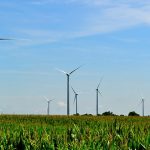Last week, the UN sounded the alarm bell about an impending food crisis driven by climate change, and it identified reducing food waste as an essential part of the solution. Currently, almost one-third of the world’s food supply ends up in the trash. Food waste is a serious, yet often overlooked, ecological hazard, responsible for 8% of greenhouse gas emissions, one-fourth of our freshwater usage, and one-fifth of the trash in American landfills.
As we struggle to address climate change and its threat to our food security, many solutions seem daunting and politically divisive. Food waste is one area where there are relatively painless ways to have a serious impact. We don’t need to consume less, tightening our belts or giving up our favorite foods, if we can consume smarter by using technology and data to make our food system more efficient. From apps where consumers can buy “ugly produce” to data systems that help grocers avoid overordering meat, machine learning, big data, online marketplaces, and other promising technologies offer a path to significantly reduce food waste…
Read the full article at Fast Company.
This article was produced by Footnote in partnership with the W. P. Carey School of Business at Arizona State University.





